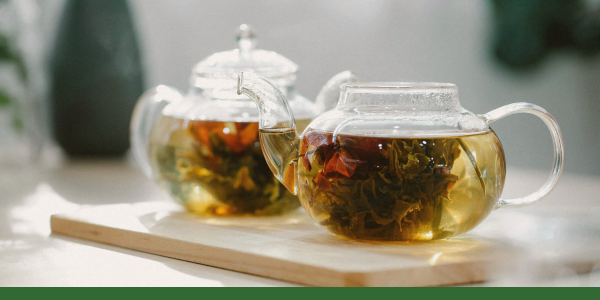
From Stress to Sleep: Natural Ways to Calm Your Nervous System
Written by Angela Shand
Why having a calm parasympathetic nervous is so important for sleep:
Getting enough sleep reduces our stress hormone cortisol, supports our immune system, regulates our mood, enhances cognitive function increasing our ability to stay focused, solve problems and make decisions. A calm nervous system and better sleep also helps us to regulate our emotions and be less reactive.
Tea of the Month: Neurofort Tea from Gaia Garden
Our Tea of the Month 'Neurofort' is Traditionally used in Herbal Medicine in cases of insomnia due to stress and to ease nervous tension.

Breathing techniques to calm the nervous system and the vagus nerve.
• To balance the vagus nerve, the breathing technique would be inhale for 4 counts, hold for 7 counts, exhale for 8 counts.
• Diaphragmatic breathing (belly breathing)
• Box breathing
• Alternate nostril breathing
The technique involves inhaling for 4 seconds, holding for 4 seconds, exhaling for 4 seconds, and holding again for 4 seconds.
Other things we can do to calm our nervous system in the evening:
• Avoid computer and phone screens at least an hour before bed, two may be better. Screens emit a blue light that can supress melatonin.
• A guided meditation or deep breathing to quiet the mind.
• Tapping on the sternum can also stimulate the vagus nerve, a primary nerve in the parasympathetic nervous system,
This stimulation can promote calmness, reduce anxiety and stress, and may improve emotional regulation.
• A relaxing bedtime routine may calm the nervous system such as bath, cup of tea, book, yoga or relaxing music.

Herbs in our Neurofort Tea
Skullcap, Valerian, Chamomile, Blue Vervain, Ginger, Black Cohosh, St. Johns Wort, Oat Seed
Skullcap: The British Herbal Pharmacopeia lists skullcap as a mild sedative and recognizes the use of skullcap for nervous disorders due to anxiety, tension or stress; headaches, migraine, panic attacks, restlessness, sleep disorders, premenstrual tension and period pain.
Valerian: has been used since ancient Greek and Roman times as a remedy for insomnia.
In the 16th century Valerian was used to treat nervousness, trembling, headaches and heart palpitations. It has been used traditionally as a benefit to the nervous system and helps to promote sleep.
Chamomile: is a gentle herb known throughout most of the world which has been used continually for many centuries. It is often ingested as a tea for calming purposes, for soothing stress and nervous tension. Chamomile has an affinity towards liver, gallbladder, digestive system, nervous system, respiratory system and musculoskeletal system.
Blue Vervain: is good for people who are intense, who set high standards and don’t have the strength or energy to keep up with tasks or activities they demand of themselves.
Blue vervain supports individuals with tension and is useful for headaches or neck pain caused by extreme tension.
Ginger: may reduce anxiety and support mental well-being by increasing blood flow to the brain, improving vagus nerve function, and possibly increasing serotonin and dopamine.
Black Cohosh: was traditionally used as an antispasmodic herb that is particularly useful for cramping and muscle pain of all types. It was also traditionally used for nerve related pain, whiplash, and pain related to spinal injuries (Wood, 2009). It is also an autonomic nervous system regulator.
St. John's Wort: relaxing and calming effect on the nervous system, specifically as a relaxing nervine. It has a long history of use in Western herbal medicine and has been thought to help maintain emotional balance and help in depression.
Oat Seed: In the 19th century, Eclectic physician Finley Ellingwood, described Avena as a “remedy of great utility in loss of nerve power and in muscular feebleness from lack of nerve force.” H.W. Felter, another well known Eclectic, had said that its chief value in medicine “is to energize in nervous exhaustion with or without spasms”.

How to Prepare This Tea
Infusion: Add 1 teaspoon of Neurofort Tea to one cup of boiling water. Steep for 15-20 minutes, mix and enjoy.
Disclaimer: The information in this article is meant for educational purposes only. It is not meant to treat or diagnose. If you would like to work with herbs to support your health please consult your healthcare provider.
About the Author
Angela Shand
Holistic Health Practitioner at Gaia Garden Herbals for the last 20 years.

